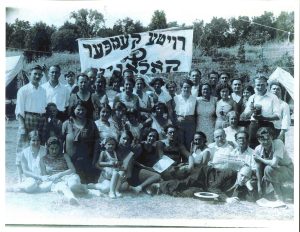 Things are tough on university campuses these days, where anti-Semitism and anti-Zionism have gained a foothold. As the rhetoric, intensity and decibels rise, many students across North America report feeling shocked, assaulted and intimidated by what they encounter.
Things are tough on university campuses these days, where anti-Semitism and anti-Zionism have gained a foothold. As the rhetoric, intensity and decibels rise, many students across North America report feeling shocked, assaulted and intimidated by what they encounter.
Campus anti-Semitism comes in as many forms as in the rest of society. Although prejudice against Jews and Judaism is “the oldest hatred,” to use the phrase of historian Robert Wistrich, it has the dubious fortune of finding itself endlessly renewed. New Republic literary editor Leon Wieseltier recently pointed to “religious varieties and secular varieties; theological varieties; political varieties and cultural varieties; old varieties and new varieties… of the right… and of the left. And… anti-Zionism.”
The so-called “Israel Apartheid Week” (IAW) is becoming increasingly and disturbingly a feature of North American campuses. Its demonstrations and exhibitions bring together what historian Jonathan Judaken has identified as five “vectors” of contemporary anti-Semitism: Holocaust denial, anti-Zionism, anti-Semitism of the far left, anti-Semitism of the Islamic world and anti-Semitism couched in anti-racism.
Very few universities have prohibited IAW outright. It’s difficult for universities to ban it, because doing so would appear to be censorship and would run up against the concept of academic freedom. While academic freedom means slightly different things in different countries, the underlying principle is, in the words of the U. S. Supreme Court, that “teachers and students must always remain free to inquire, to study and to evaluate, to gain new maturity and understanding; otherwise our civilization will stagnate and die.”
The American Association of University Professors elaborates: “Universities… interpret, explore, and expand that knowledge by testing the old and proposing the new. This mission… inspires vigorous debate on those social, economic and political issues that arouse the strongest passions. In the process, views will be expressed that may seem to many wrong, distasteful or offensive. Such is the nature of freedom to sift and winnow ideas. On a campus that is free and open, no idea can be banned or forbidden. No viewpoint or message may be deemed so hateful or disturbing that it may not be expressed.”
Universities, however, must also ensure the safety of students and abide by the laws of the land. Canadian universities must balance the principle of free speech with laws governing hate speech, libel and defamation. All campuses must prevent physical violence. And it’s difficult to reconcile the notion of rigorous debate with slogans and clenched fists.
As universities find ways to balance intersecting and sometimes opposing principles, are campus communities helpless in the face of such movements as IAW? I don’t think so. After the initial shock of disturbing and distorting images and rhetoric, students are finding their voices to counter its arguments.
It’s crucial to arm oneself with knowledge. In addition to knowledge about Israeli history, politics and culture, books and courses that deal with the history, strategies and manifestations of anti-Semitism help to contextualize contemporary attitudes and to explain to others why certain remarks and arguments are anti-Semitic.
While Israelis hold diverse opinions and may be critical of government policies without being anti-Semitic, criticism of Israel quickly morphs into anti-Semitism, especially when it denies Israel’s right to exist. Anti-Zionism often adopts the tactics and mentality of anti-Semitism.
Three classic anti-Semitic strategies are scapegoating, demonizing and isolating Jews.
Scapegoating means blaming a person or group for things that go wrong, as Jews were blamed for Germany’s problems under National Socialism, or as Israel is deemed the root cause of political unrest in the entire Middle East, or globally.
Demonizing means presenting a person or group as evil by nature – considering Jews degenerate and immoral, or Zionism inherently racist. These ways of thinking have isolated Jews in the face of oppression, just as claims that Israel is racist, apartheid or Nazi-like have pushed to cast Israel as a “pariah state,” excluded from the family of nations.
Some scholars of anti-Semitism have begun to refer to its latest manifestation as “Judaeophobia” and “Israelophobia.” These new terms make clear to progressive groups on campus – who actively oppose such phenomena as homophobia and Islamophobia – that current anti-Israel discourse reflects an irrational fear that leads to hatred and discrimination.
Students attend universities to get an education. Increasingly, they’re also empowering themselves to become educators.






